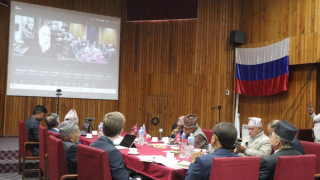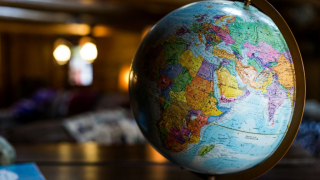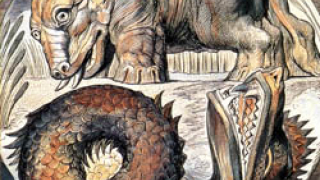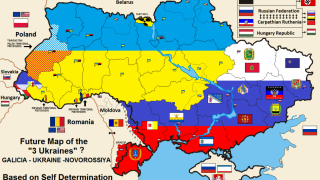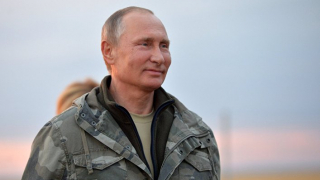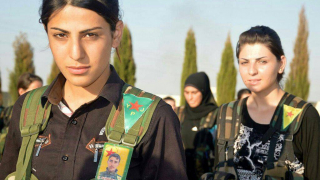Geopolitical aspects of the information warfare in the Northwestern Caucasus
The postbipolar world, preserving its former tools for conducting ordinary wars (military operations) and economic wars, to an increasing degree put emphasis on so called “information” and “network” warfare. Their distinctive feature is the circumstance of being conducted globally and totally — against enemies, neutrals and fighting partners, both in the period of war and in the period of peace. The award for this permanent struggle is world domination, which is called in recent years by the Americans “global leadership”.
The characteristic features of the latest two National Security Strategies of the USA became strengthening of hegemonic tendencies and “ideologization” of the foreign policy of the United States of America. The main criteria of appraisal of prospects of developing relationship between the USA and foreign countries became the “behavior”of one or another country, to be more accurate – whever it complies or not with the American understanding of democracy and needs for the fight against “global evil” including undesirable regimes. Thereby Washington appropriated an exclusive right to interpret the concept of democracy[1] and to appoint successive “whipping boys”, destroying and crushing whereby the remnants of the Westphalian system of international relations. The examples connected with the events in Afghanistan, Iraq, Libya, and now also in Syria are the plain evidence of it.
Crucially important that in contrast to the existed in 2002 practice of ascribing one or another country to “the axis of evil” on the basis of accusation of supporting international terrorism, in the latest Strategy the main criteria for selection of applicants for being added to the American “black list” have become their political order not corresponding to the USA's understanding of “true democracy”. Herewith for justification its claims to world dominance the American elite adopts abstraction of increasingly high order (such as global struggle of “the good against the global evil”, “protection of freedom”, “democracy advancement” etc.), without specifying regions and countries, which can become their application objects, they become known practically just before the beginning of military operations. As regards Russian and China which are the main geopolitical competitors of the United States,in recent years Washington strengthened its critics towards them, accusing them of democracy principles and human rights violation, and of authoritarianism. In other words, China and Russia are the main geopolitical rivals of the USA.
The essence of neoexpansion policy being pursued by the USA is consists in the fact, that Washington legitimates and justifies the necessity of providing security of the USA, their confederates and partners, open and / or concealed invasion of the most important spheres of vital activities of sovereign states, violating international principles of sovereignty and independence of the countries being members of UN. This is the essence of the present-time geopolitics of the United States practically in all the world areas, as the all of them, without exclusion, are declared to be the zone of the vital interests of this superpower. One of such macroregions is “the Big Near East” (BNE), which is already being fundamaentally restructured by the USA within the context of their geopolitical interests. Caucasus, in its turn, serves as a subregion of BNE.
The American geopolitical megaproject in the Caucasus (North and South) is realized not only by way of reinforcement of their own geostrategic and geoeconomical positions by the USA, but also by means of manipulating and controlling the other participant of the geopolitical play in the region by Washington. Immediate military cooperation is developed with Georgia and Azerbaijan. With the participation of American military specialists a fundamental reform of the Georgian armed forces have been carried out, new, well equipped and prepared units and formation have been created, and a considerable part of the state budget of Georgia is used for reimbursement of military costs. New conditions for creation of military bases are formed in Georgia and in Azerbaijan. For example, two American radar stations already operate in the North and in the South of Azerbaijan, several airdromes for using them in the interests of air forces of the USA are prepared, and as specialists suppose – for eventual conduct of military actions, principally against Iran. Such activity in Georgia is carried out much more widely.
Simultaneously geoeconomical projects aimed at goal-oriented economical forcing out of Russia out of the region are implemented. That means, in the first instance, commissioning of the main export pipeline Baku – Tbilisi – Ceihan, and lobbying other pro-Western projects like Nabukko.
Except these directions, being realized by the Americans in the spirit of the classical geopolitics (military aspects) and new geopolitics (economical projects), as previously mentioned, best practices in the sphere of the newest geopolitics (geopolitics of information era or geopolitics of postmodernity) are used. American “soft power” is successfully specialized in organizing “flower revolutions”, networks of any form of dissidence and pseudo opposition, from wahhabism to anarchism in many regions of the world[2]. Particularly, hundreds and perhaps thousands of different nongovernmental organizations, funds, centers and other structures, being financed and supported by many foreign and international organizations act in Caucasus. Certainly, all these structures are tools for conducting network-centric operations (network warfare), as a local kind of them so called “flower revolutions” serve. These are pro-Western (more often pro-American) take-overs, carrying out in one or another country or region in the interests of the West (USA) using network warfare toolkit. It is well known, that all these “revolutions” are planned and implemented within the frameworks of the American-centric Strategy of globalization and unipolar world order.
A seamless part of Caucasus, the Northwest Caucasus is one of the platforms for the network warfare being conducted against Russia, and the situation of the region in whole demonstrates typical network approach: the Americans use absolutely different, it should seem, not connected with each other forces in their own interests. It is natural, that network warfare (wars of the information era) do not abolish any geopolitical models of the past. In the channel of the traditional geopolitics armed force is used, and geoeconomics put emphasis on the implementation one or another economical projects. However the leading actors of global and regional politics in the modern world primarily use information and network capabilities, which are supported with economical projects, and only in case of emergency other military forces and capitals are used. All this is realized in the spirit of time, taking into account economy of force, because implementation of information wars is many times cheaper, than economical or, all the more, military operations. Besides, “bloodless” wars are essentially more effective than real ones, which are accompanied with great destruction and death of a great number of people. The destiny of the Soviet Union can serve as an outstanding example. This state 20 years ago became history without any nuclear-missile attacks, about which in the proper time the Soviet leaders of pro-Gorbachev era were so apprehensive.
For the purpose of conducting information wars and network-centric operations newsworthy events are needed. Such events can be real or constructed. One of such events for the Northwest Caucasus are the Olympics, which must be conducted in 2014 in the territory of Sochi and Krasnaya Polyana. The case is the events passed almost 150 years ago, the development and the results of the Caucasian War (1818-1864). Blowing things out of proportion regarding the events of long-ago, geopolitical enemies of Russia strive to drive a wedge between the different nations living in our country, to deepen the crisis of identities, to slow the process of establishment and development of united Russian civil society, united Russian civil nation.
The Caucasian War in the Northwest Caucasus inhabited predominantly by numerous Adyghe tribes in opposition to the Northeast Caucasus (Dagestan, Chechnya, Ingushetia), did not have the nature of “ghazawat” (military jihad) and was generally based on the relations of ethnic solidarity. It is recognized, that the mentioned war was over just in the Northwest Caucasus on May 21, 1864, when in the territory of present- time Krasnaya Polyana, where the 2014 Olympics are planned to be conducted, a parade of the czar's troops was organized. Before that the Ubykhs, representatives of the Adyghes, lived there. A part of them died in the course of the war, and the major part emigrated to the Ottoman Empire in consequence of so called “Muhajirun” (emigration).
Their tragic destiny nowadays became an object of the focused attention of oversea guardians of “human rights”, who in all appearances forget that in the base of construction of the United States as a state two basic sins lie: almost full extirpation of the autochthonic population (the American Indians), slave trade and slave owning. However at the present time they get a successive occasion for accusing Russia of that long-ago events and for creation of false representation of the present-time Russian policy in the Northwest Caucasus to the world community (as they say “people who live in glass houses should not throw stones”). Primarily different organizations of the Great Britain and the United States, especially nongovernmental ones, brought to public discourse of the world scientific community an idea of formation of an independent Adyghe state, fro the purpose of which opened the floor for the representatives of Adyghe non-governmental organisations, which construct the most different separatist projects.
In the course of information warfare against Russia different American and several Western funds, organizations and structures are use. Thus, American “Jamestown Fund” established in 1980 and having close relationship with the government of the USA and with CIA, as one of the main spheres of activity has chosen critics of Russian policy implemented in the North Caucasus. Far example, on May 21, 2007 at the a conference conducted by this fund in Washington an idea of creation of an independent Adyghe state was sounded. In accordance to the idea the state must unite the territories of Adygei, Kabardino-Balkaria, Karachay-Cherkessia and so called Black Sea Shapsugia. The same idea was developed during a conference, conducted on April 8, 2009 in Harvard University (USA), where one of the contributors emphasized, that implementation of the project of a Circassian Republic will allow the Circassians to win independence from Russia. A similar thesis was sounded during the annual conference in Columbia University (USA) in April of 2009, where some representatives of foreign Adyghe diaspors made a proposal of formation of a government of Circassia in exile, which would have its representative body in the General Headquarters of EC, and also in the USA and in Turkey.
Former ambassador of the USA in NATO Kurt Walker in an article published on May 25, 2010 in The Washington Post newspaper declared expressly, that the 2014 Olympics in Sochi can be boycotted by the most of the Western countries. To his opinion, presence of the representatives of the governments of Abkhazia and South Ossetia at the Olympic Games, which “intent upon positioning themselves on equal terms with the leaders of other countries make the Olympics a politically disputable arrangement”.
Within the context of widening separatist projects for reconstruction of the Northwest Caucasus it is reasonable to mention briefly the evolution of the forwarded project of so called “Circassian Republic”. Calling for restoration of “historical justice” some activists of radical Adyghe nongovernmental organizations in the recent years have been insistently declaring about formation of a new monoethnic constituent unit of the Russian Federation, which would unite the territories of historical habitation of the Adyghes – Adygei, Kabardino-Balkaria and Karachay- Cherkessia. In particular, the idea of creating a Circassian (Adyghe) republic was sounded at the Special congress of the Circassian nation of Karachay-Cherkess Republic, conducted on November 23, 2008 in Cherkessk. One year on it was included into “the Resolution of the Forum of Circassian (Adyghe) youths», which also took place in Cherkessk on September 12, 2009, and already on November 5, 2009 on www.elot.ru web-site an appeal of “The Youth's Adyghe Khase of Karachay-Cherkess Republic” organization to the Chief of the Administration of the President of the Russian Federation S.Y. Naryshkin and to the Plenipotentiary of the President of the Russian Federation in the Southern Federal district V.V. Ustinov, in which it was declared about the intention of raising the question of self determination of the Circassian nation.
As you can see, it is spoken in Russia and at the state level about the intention of creating a Circassian republic within the Russian Federation, and at foreign forums – about construction of an independent Adyghe state. The difference is evident, isn't it? Such a discrepancy is just in the spirit of geopolitical views of the Russia's enemies, dreaming about its partition.
Georgia became almost the main platform, from which new impulses of information warfare are received. Its president M. Saakashvili hard on the heels of of its military gamble failure in August of 2008 proceeded to development of its new North Caucasian policy. The dynamics of its development can be traced by means of studying the following foreign policy initiatives of Georgian government:
- In December of 2009 in the Parliament of Georgia the Group of friendship with the parliaments of the North Caucasus was formed, which in the Spring of 2010 addressed official letters to the members of legislative bodies of the Republics of the North Caucasus. However this initiative by evident reasons did not meet a response expected by official Tbilisi.
- In January of 2010 in Georgia “The First Caucasian” TV-channel was opened. It was declared, that the aim of the channel is providing the North Caucasus with objective information about any events taking place in Georgia. At the present time the channel broadcasts only in the Internet, because “Eutelsat” French company refused its satellite service providing. It should be noted that in July 2010 “The First Caucasian” TV-channel was devoted 7 million lari from the reserve fund of the Government of Georgia.
- The question of “the Circassian genocide” is fundamentally mooted. In March 2010 in Tbilisi an international conference on a topic “Concealed nations, continuing crimes: the Circassians and the nations of the North Caucasus between the Past and the Future” took place. The conference was organized by Washington Jamestown Fund and the International School for Caucasian Researches of Ilia Chavchavadze Tbilisi State University. Being provoked by the Georgian party representatives of the Circassian diaspora present at the conference appealed to the Parliament of Georgia with a request for recognition of the “Circassian nation Genocide”, which is supposed to be implemented in XIX century by the Russian Empire. In April of the same year the Georgian deputies declared, the the Parliament is ready to explore and discuss the question of the Circassian “genocide”.
- On September 23, 2010, appearing at the 65th session of the UN General Assembly the president of Georgia M. Saakashvili put forward an initiative of creating “Caucasian Confederation”. The speech of the Georgian leader is qualified by the experts as a claim of official Tbilisi for conducting activated, especially within 2010-2011, new North Caucasian policy. It is absolutely clear that the goal of the Georgian project of the “Confederation” is an attempt of the isolation from the North Caucasus with simultaneous support of the anti-Russian separatist movement existing there, restoration of the leading role of Georgia in the region. It is also absolutely clear that the idea of creating the confederation has a character of separation from life realities, and its implementation is impossible in practice.
- On October 11, 2010 the Ministry of internal affairs of Georgia published the decision of the Government of Georgia of introduction visa-free regime for the citizens of seven North Caucasian constituent units of the Russian Federation. The mentioned decision came into effect on October 13 of the same year. According to the press-speaker of the President of Georgia, the waiver shall be considered in the context of the “United Caucasus”, mentioned by Mikheil Saakashvili from the rostrum of UN.
- In the end of November 2010 the Parliament of Georgia established the Commission for preventing of conduction of the 2014 Winter Olympics in Sochi. The Commission plans to develop an information campaign against the Olympics in international mass media, preparation of the appeals of Georgian refugees from Abkhazia and well-known sportsmen to IOC, organizing protest actions abroad, in the course of which the question of feasibility of conducting the Olympic Games in Sochi and their reestablishment in another country will be raised.
- And, finally, in May 2011, three years before the opening of the Olympics, the Parliament of Georgia risked to recognize the Circassian “genocide” within the years of the Caucasian War official.
It is typical that the Caucasian policy of Saakashvili is actively supported by the West – by the USA, NATO and EC. At the same time, probably, it should be recalled that Georgia had already lost not only its territorial integrity, but the sovereignty long ago, because it is in reality under the external control of the USA, and wider – of the West.
Alongside this the acts of provocation organized by Georgia and by the forces supporting it contradict to the decisions of the International Olympic committee (IOC) of “Encouragement and development of culture, based on the spirit of the Olympic truce”. The periods of “cold war”, when was used as a tool for putting pressure on one or another opposing party ended almost two decades ago. Just for the purpose of protecting the Olympic movement from any backslides of the Past articles about the obligations of national Olympic committees concerning the necessity of participation in the Olympic Games were included in the Olympic Charter. Any country declared boycott to the Olympics will be subject to serious sanctions – up to it exclusion from the international movement.
From the point of view of the ethical code of IOC, Georgia is hardly to be considered as one of the countries, adhering to the humanitarian and moral character of the Olympic values. Furthermore, Georgia is one of the countries looking forward to join the united Europe, the country, which had already used the Olympic Games for concealment of its aggressive actions. The matter is that just on the day of the opening of the Olympic Games in Beijing on August 8, 2008 Georgian aggressors began an onslaught on Tskhinval and planned an attack against Abkhazia. Therefore the UN Charter was cynically offended, especially as on the threshold of the Olympics in Beijing the UN General Assembly had adopted a resolution making a call for a global cease fire for the period of conducting the Olympic Games.
However even at the present time the regime does not want to recognize new realities in the Caucasian macroregion, in Georgia a process of demilitarization is traced, what witnesses that official Tbilisi Тбилиси did not drop their plans for reestablishing its “territorial integrity in a heavy-handed way”, which, it goes without saying, can not be accepted by Abkhazia, South Ossetia and Russia.
Alongside with that, it must be emphasized that the Olympics in Sochi is very important for all the Caucasian states and nations including Georgians. Clamoring against conducting the Olympics in Sochi, Georgia pursues its opportunistic political aims, which do not meet the interests of the international and, particularly, the regional society. Support of Georgia's initiative for boycotting the Olympic Games can cause a new aggravation of the situation in Caucasus, sow discord within the international sport activity, jeopardize the relationship with the Russian Federation.
That is why the scientific society of Russia and other friendly states should not separate themselves from the actions of information warfare being conducted by geopolitical enemies, adopting an active attitude meeting the real and multidimensional interests of our countries. The Caucasian War is a part of our common history, and we are not able to change it. However we can and must think about the future. Certainly, the own history should not be forgotten, it should be taken into account preventing the repeat of that tragic events. However it also should not be politicized in the present conditions laying the responsibility for the events passed one and half century ago on the present generations, because it will mean the only thing – capitulation in front of the enemies of Russia.
The leaders of some foreign Adyghe societies also take a disputable point of view in relation to so called “Circassian problem”, the position of which is rather often supported by their radically oriented Russian like- minded persons. The activists of some Adyghe nongovernmental organizations actively propagate an idea of restoring so called “historical justice” concerning the Adyghe nations. To their opinion it is necessary for its implementation that the Russian Federation recognizes the “genocide” of the Adyghes, which is supposed to take place in the course of the Caucasian War of the XIX century and after its end. Within the recent years this position is represented in the public. For example “The Circassian Congress” social movement twice applied (on 01.07.2005 and 24.10.2005) to the State Duma of the Russian Federation with a demand of recognition of the Adyghe nation genocide. On October 11, 2006 the Adyghe organizations of nine countries (Russia, Turkey, Israel, Jordan, USA, Belgium, Canada, Germany and Syria) appealed to the president of the European Parliament D. Fonteless with a request for recognition of the genocide of the Adyghes. In Russia this appeal as supported by “The Circassian Congress” (Adygei), “The Circassian Congress” (Karachay- Cherkessia) and “The Kabardian Congress” (Kabardino-Balkaria). On May 18, 2009 an appeal of the leaders of “Adughe Khase” of Adygei, Karachay-Cherkessia, Kabardino-Balkaria and the Shapsugs to the President of the Russian Federation was placed on www.elot.ru. The appeal contains a call to the nations of the North Caucasus to make a special declaration on the occasion of the 135th anniversary of the completion of the Caucasian War and to give a relevant estimate “to the monstrous crime of the czarist autocracy”.
The decision of the International Olympic committee (IOC) of conducting the 2014 Olympics in Sochi became a successive cause for accusations against the Russian Federation. Thus, in March 2010 the above mentioned “Jamestown Fund” appealed to IOC with a request not to conduct the Olympics in Sochi giving as the reason that they consider incorrect to conduct the Games at the place of tragic events of the Caucasian War of XIX century. According to the information of AIF, a special group named “No Sochi 2014” was organized. The group uniting a range of Circassian nongovernmental organizations appealed to IOC with a request to change the place of conducting the Olympic Games.
At the same time some Adyghe community leaders made a stand against conducting the XXII Winter Olympic Games in 2014 in Sochi under the pretext of the fact that the Games would be conducted on the native Circassian land and supposedly offend the memory of “the victims of genocide”. For the purposes of attracting the attention of the world community they intended to conduct in 2012 after the Summer Olympic Games in London, the Summer world Circassian Olympic Goodwill Games (so called “Circassiad”). After while they abandoned their plans, however they made their contribution to increasing the degree of the informational confrontation. On May 18, 2009 in the above mentioned appeal of the leaders of “Adyghe Khase” and the Shapsugs to the President of the Russian Federation it was noted that the Olympics in Sochi would be conducted on the 150th anniversary of the end of the war in Krasnaya Polyana, where on May 21, 1864 “the czar's troops conducted “the victory parade” infamous among the Adyghes”[3]. General director of KavkazWeb.net and Adyga.org Osman Mazukabzov emphasised that “recently Adyga.org web-site has begun signatures collection in support of the appeal to IOC, in which the Circassians declare about the necessity of the involving the Circassians into the process of planning and conducting of the Games. …Instead of calls to overthrow of power, separation from Russia and other extremist declarations, the appeal to IOC contains concrete and justified demands regarding the inclusion of the Circassians into the process of planning and conducting of the Olympic Games”. However further as the text goes Mazukabzov sounds absolutely different expectations: “In the near future the American parliamentarians will approve the resolution for recognition of the Armenian Genocide. Even Russia recognized that genocide. So everything is possible...” After all, the main problem, which worries Mazukabzov and his like-minded persons are “recognition of the genocide committed towards the Circassians150 years ago”.[4]
However the most of the Adyghe organizations and reputable community leaders take more more moderate, bottom-line positions. Particularly, on February 27, 2010 during the meeting of the International Circassian Association (ICA), at which delegations of the Adyghe diaspora from the USA, Europe, Syria, Jordan and Turkey were present, an appeal to the President of Russia D. Medvedev was stated, in which it was declared that the Organisng committee of the Olympics in Sochi “ignores the history and the culture of the indigenous population of the Black Sea region – the Circassians (Adyghes)”. In this regard ICA intends to ask the President to provide publication of any information concerning the forthcoming Olympics “taking into account the history and the culture of the Adyghes”.[5] The State Council – Khase of Adygei (the Parliament of the Republic of Adygei) overlooked the problem neither, having approved in the end of March 2010 an appeal to the Olympic committee of Russia and to the Commitee of the XXII Olympic and Paralympic Games concerning participation of the Circassians in organizing and cultural arrangements of the 2014 Olympics. In this appeal, particularly, it is noticed that “in the course of preparation for the 2014 Olympics state and nongovernmental structures, unfortunately, totally ignore the history and the culture of the Circassians (Adyghes)”. “We are sure that inclusion of Adyghe motives into the complex of the Olympic arrangements, paying attention to the history and to the culture of the indigenous population of the Black Sea region – the Circassians (Adyghes) will have a positive bearing on the atmosphere of the Games and will be considered by the collective consciousness of Russian and foreign Circassians as the respect for their national feelings and the exercise of good will… We propose within the frameworks of the informational and cultural program of the forthcoming Olympics to the full extent take into account the history and the culture of the Circassian (Adyghe) nation as an indigenous ethnic group of the Russian Black Sea region. We, the deputies of the State Council – Khase of the Republic of Adygei kindly ask you to consider the possibility of solving the mentioned issue having an important socal and political significance and in full measure corresponding to the state interests of Russia.[6]
Seemingly, it is rather reasonable and acceptable proposal”.
However the government have only made a decision in accordance to to which the “Memorial of Memory and Solidarity” dedicated to the victims of the Caucasian War[7] will be built in the center of Maykop (the capital of Adygei). There are no any other official initiatives. Nevertheless, different reasonable proposals are received from individual persons. For example, yet in 2007 one of the authors proposed to “draw a line” under the Caucasian War and by the example of many of the European countries “to build in the territory of Krasnaya Polyana a monument to the Adyghes and the Russian warriors ” fallen on the field of battle during that war. This symbolic action, as the author of the article supposes, “will be positively appreciated by the public mind in Caucasus…”[8]
Thus, the problem exists, it has internal and external measure and is not to be concealed. The geopolitical enemies of Russia parasite upon it, and this means that the information warfare will be only developed progressively as the day of the opening of the Olympic Games approaches, to an increasing degree drawing in the whirligig different forces, organizations, personalities. Any negative information, it would seem, should be countered with own informational capabilities of Russia based on real actions and achievements aimed at elimination of the internal conflict potential. However it is not enough too, as for effective prevention of any destructive tendencies in the Caucasus and upholding of the national interests of RF in the region it is necessary, in the first instance, to fight against the main player of the modern “Great Game” (USA), foresee its successive moves, implement a system of measures for prevention and control of ethnic and religious conflicts. After all potential zones of conflicts and fault lines are activated not in themselves, but in the course of thought out well-weighted geopolitical operations of the general and active participant of the Caucasian geopolitics in whole, that is the USA. Responding only to the consequences of this global strategy Russia in future the future will have to retreat and gradually give ground as before. The only way to win is to take an active stand in the “Great Game” having understood previously its conditions, content, system of interrelationship and conformity.
Published in Journal of Eurasian Affairs
[1] Цветов А.И. Эволюция внешней политики США: от Джеймса Монро до Джорджа Буша-младшего // Политика в XXI веке: вызовы и реалии: Аналитический альманах / Под ред. Е.М. Кожокина; Рос. Ин-т стратегич. исслед. – М.: РИСИ, 2007. - № 7 (17). – С. 46.
[2] Тхагапсоев Х. Страсти политологов по Кавказу // Кабардино-Балкарская правда, 06.02.2010.
[4] http:/www.KavkazWeb.net. 2010. – 9th of March.
[6] http:/www.KavkazWeb.net. – 2010. – 31st of March.
[7] Интерфакс. – 2010. – 18th of March.
[8] Манкиев М. Не подведенные итоги Кавказской войны и Олимпиада 2014 в Сочи //http:/www.fondsk.ru


